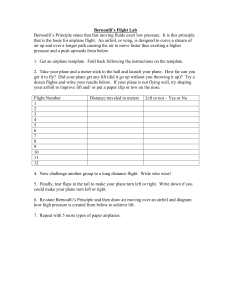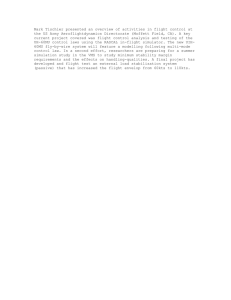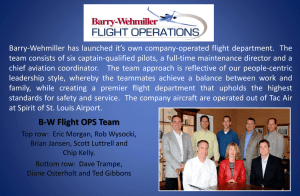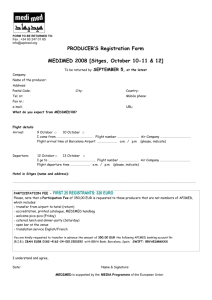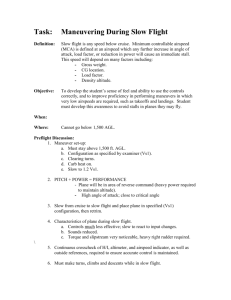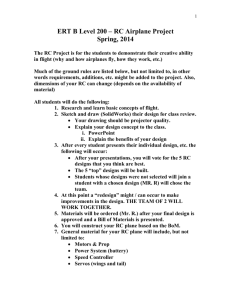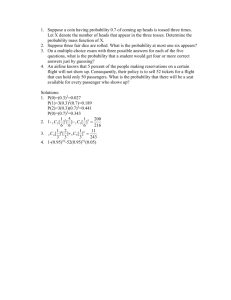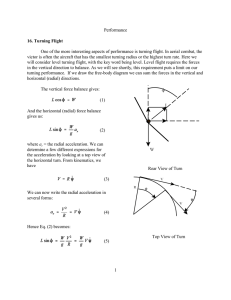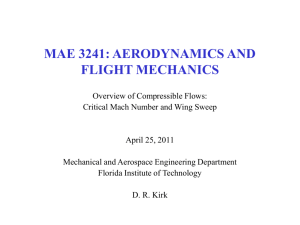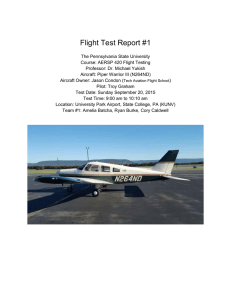Course Syllabus
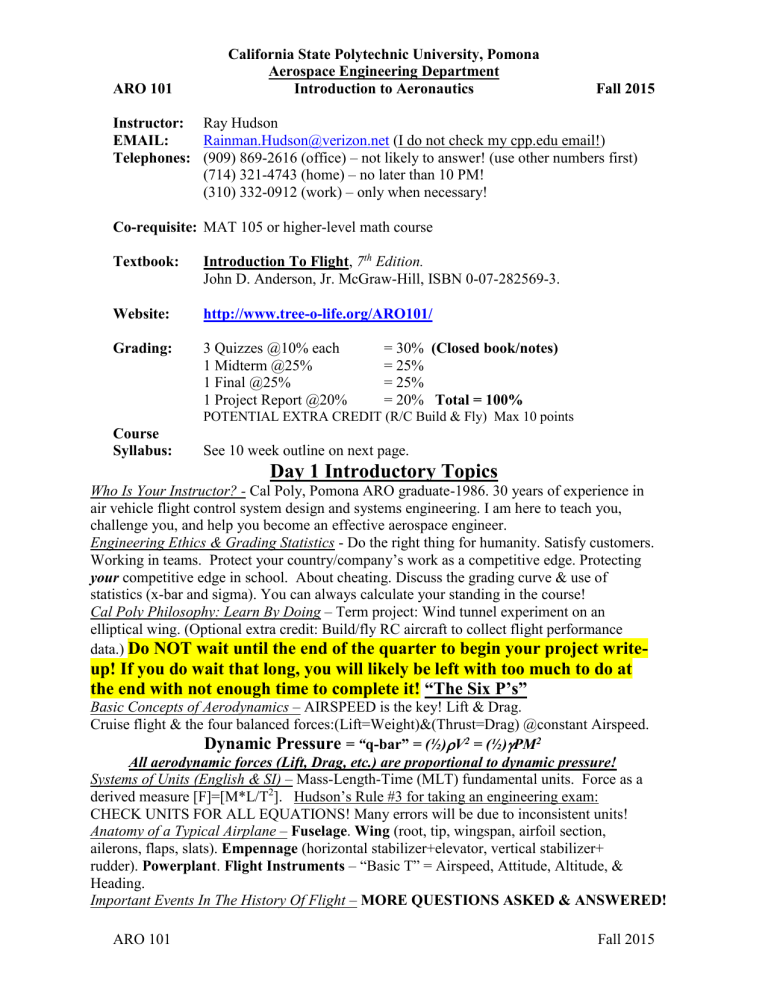
California State Polytechnic University, Pomona
Aerospace Engineering Department
ARO 101 Introduction to Aeronautics Fall 2015
Instructor: Ray Hudson
EMAIL: Rainman.Hudson@verizon.net
(I do not check my cpp.edu email!)
Telephones: (909) 869-2616 (office) – not likely to answer! (use other numbers first)
(714) 321-4743 (home) – no later than 10 PM!
(310) 332-0912 (work) – only when necessary!
Co-requisite: MAT 105 or higher-level math course
Textbook: Introduction To Flight , 7 th Edition.
John D. Anderson, Jr. McGraw-Hill, ISBN 0-07-282569-3.
Website: http://www.tree-o-life.org/ARO101/
Grading: 3 Quizzes @10% each = 30% (Closed book/notes)
1 Midterm @25%
1 Final @25%
1 Project Report @20%
= 25%
= 25%
= 20% Total = 100%
POTENTIAL EXTRA CREDIT (R/C Build & Fly) Max 10 points
Course
Syllabus: See 10 week outline on next page.
Day 1 Introductory Topics
Who Is Your Instructor? Cal Poly, Pomona ARO graduate-1986. 30 years of experience in air vehicle flight control system design and systems engineering. I am here to teach you, challenge you, and help you become an effective aerospace engineer.
Engineering Ethics & Grading Statistics - Do the right thing for humanity. Satisfy customers.
Working in teams. Protect your country/company’s work as a competitive edge. Protecting your competitive edge in school. About cheating. Discuss the grading curve & use of statistics (x-bar and sigma). You can always calculate your standing in the course!
Cal Poly Philosophy: Learn By Doing – Term project: Wind tunnel experiment on an elliptical wing. (Optional extra credit: Build/fly RC aircraft to collect flight performance data.)
Do NOT wait until the end of the quarter to begin your project writeup! If you do wait that long, you will likely be left with too much to do at the end with not enough time to complete it! “The Six P’s”
Basic Concepts of Aerodynamics – AIRSPEED is the key! Lift & Drag.
Cruise flight & the four balanced forces:(Lift=Weight)&(Thrust=Drag) @constant Airspeed.
Dynamic Pressure
= “q-bar” = (½)
V 2 = (½)
PM 2
All aerodynamic forces (Lift, Drag, etc.) are proportional to dynamic pressure!
Systems of Units (English & SI) – Mass-Length-Time (MLT) fundamental units. Force as a derived measure [F]=[M*L/T 2 ]. Hudson’s Rule #3 for taking an engineering exam:
CHECK UNITS FOR ALL EQUATIONS! Many errors will be due to inconsistent units!
Anatomy of a Typical Airplane – Fuselage . Wing (root, tip, wingspan, airfoil section, ailerons, flaps, slats). Empennage (horizontal stabilizer+elevator, vertical stabilizer+ rudder). Powerplant . Flight Instruments – “Basic T” = Airspeed, Attitude, Altitude, &
Heading.
Important Events In The History Of Flight – MORE QUESTIONS ASKED & ANSWERED!
ARO 101 Fall 2015
California State Polytechnic University, Pomona
Aerospace Engineering Department
Week Section Title Material Covered Textbook
Sections
Block 1: Introduction to Airplanes, Pressure Concepts & the Atmosphere
1
30-SEP
Course Introduction.
Basics of Airplanes.
History of aviation. Systems of units. Anatomy of a conventional airplane.
2
7-OCT
The Physics of Fluids
(Gases and Liquids).
Air pressure, density, & temperature. Flow velocity
& streamlines. Ideal gas law (equation of state).
3
14-OCT
The Standard
Atmosphere. The
Altitude definitions. The hydrostatic equation.
Troposphere, Stratosphere. ICAO Standard
Continuity Equation. Atmosphere model. The continuity equation.
Block 2:
Bernoulli’s Equation, Airspeed Measurement, MIDTERM,
Chap. 1,
Sec. 2.4, 2.6,
Sec. 2.1, 2.2, 2.3
Chap. 3
Sec. 4.1
4
21-OCT
5
28-OCT
6
4-NOV
& Wind Tunnel Experiment
Dynamic Pressure &
Airspeed Measurement.
Mach # & compressible flow. Total, static, & dynamic pressure. Bernoulli’s Equation. Low-speed wind tunnels. Airspeed measurements.
MID-TERM
(Open Book/Notes)
Exam Covers: Units (Dimensional Analysis).
Hydrostatics. Ideal gas law. Standard Atmosphere.
Continuity & Bernoulli’s equation. Airspeed measurement.
Wind Tunnel
Experiment
Review midterm problems/solutions. We will perform an experiment on an elliptical wing model in the subsonic wind tunnel. Collect axial and normal force balance data. Compute CL and CD from wind tunnel data for your test report due week #9.
Sec. 4.2, 4.3,
4.10, 4.11
ALL OF THE
ABOVE
SECTIONS
Website
Material
7
Block 3: Airfoil Basics & Performance, Basic Stability, Control, & Flight Operations.
11-NOV
VETERANS DAY No classes in session. Maybe work on your report?
8
18-NOV
9
25-NOV
Airfoil Basics,
Performance & Angle of
Attack.
Flight Stability, Control, and Operations.
Anatomy of airfoils. Airfoil pressure, lift & drag coefficients. Angle of attack. NACA airfoil performance data.
AoA
(
) stability. Level flight, Climb & Descent.
AoS (
) stability. Lateral & vertical flight dynamics angle definitions. The basic flight cycle.
Sec. 5.1-5.4
Website
Material
10
2-DEC
Course Review. Q&A,
Problem Solving
Session. Prepare for
Final Exam.
WIND TUNNEL TEST REPORT DUE BY END OF
CLASS TODAY!
This is YOUR time. Write down concepts you do not understand, prepare questions, and be willing to discuss them in class.
ALL COURSE
MATERIAL
ARO 101A SEP-2015
